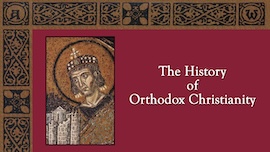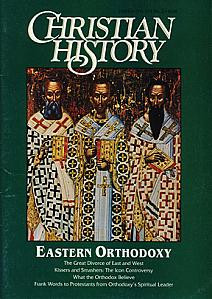Gregory Palamas Defended the "Uncreated Light of God"

Palamas was a major theologian of the Greek Orthodox Church. Image by Lamprotes at Wikipedia.
NINE YEARS after the death of Gregory Palamas, a special council of the Eastern Orthodox Church declared him a saint. The council went further and named him “the greatest among the fathers of the church.”
Gregory Palamas was born in 1292. Before the turn of the century, his mother died, but Palamas never forgot her. Some scholars think he transferred his adoration of her to the Virgin. His father was a senator and prepared Palamas for a high position in Constantinople, where the family was on good terms with the emperor, who had a great respect for learning.
Fourteenth century Byzantium was crumbling before the advances of Islamic Turks and eroding internally from ceaseless squabbling. Perhaps it was these circumstances that led the twenty-year-old Palamas to abandon literature and political pursuits and to become a monk instead. A proponent of the ascetic life, he soon encouraged his siblings to do the same.
At the famous monastery at Mt. Athos, Palamas learned the tradition of prayer known as hesychasm. This consisted of reciting over and over “Lord Jesus Christ, Son of God, have mercy upon me,” while ignoring the senses and controlling posture and breathing. Some of the monks claimed that praying in this way, they saw the uncreated light of God that had shone from Christ at the transfiguration.
A monk from the West took issue with this practice, claiming God is unknowable. Others argued that such an uncreated light would rival God, adding a member to the Trinity. The argument simmered for years. Palamas was even imprisoned over it. Matters came to a head on this day, 10 June 1341, when an Orthodox council met in Constantinople at the great church named Hagia Sophia (Holy Wisdom). It was a sweltering day, but the emperor attended in full regalia. He ordered that the matter be settled that day. The council upheld Palamas and criticized the teachings of Bernardo Barlaamo, the opposing monk.
If the emphasis of Palamas’ theology was on the uncreated light of God, the emphasis of his devotion was on Mary. He described her in effusive terms as “worshipped and marveled at and hymned by all the faithful,” and declared: “She is the glory of those upon earth, the joy of celestial beings, the adornment of all creation. She is the beginning and the source and root of unutterable good things; she is the summit and consummation of everything holy.”
Within a few years, the empire was in the throes of civil war, and active men rose against the emperor, whose resistance to the Turks was feeble. Palamas tried to bring about reconciliation. However, he was jailed by his opponents and later by the Ottoman Empire. Upon his final release, he was old and weary, and he died in 1359.
—Dan Graves
----- ------ ------
For an an in-depth look at the history and distinctive beliefs of the Orthodox Church watch The History of Orthodox Christianity
(The History of Orthodox Christianity can be purchased at Vision Video)
For more on Eastern Christianity read Christian History #54 Eastern Orthodoxy, then and now








